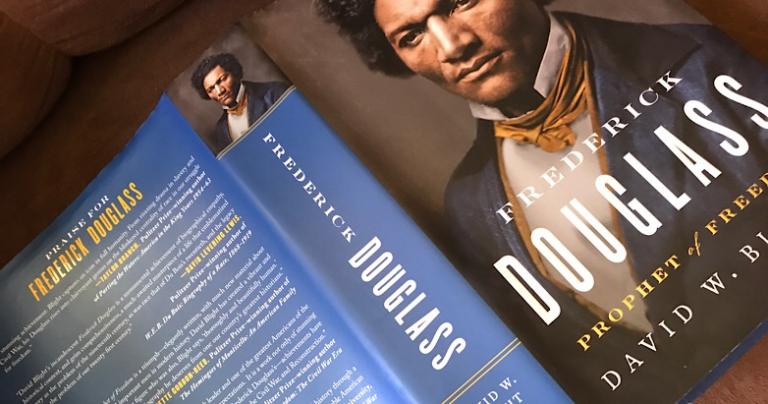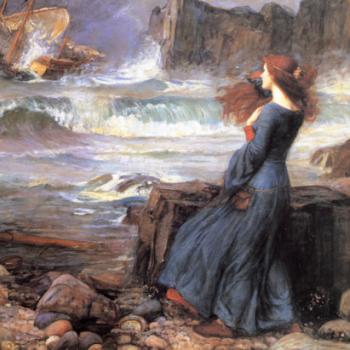Growing up and going to graduate school in Rochester, New York meant Frederick Douglass was everywhere: an icon of greatness. That’s good, as far it goes, but an icon should point to the man, the African-American man, and not keep us from his reality. We need his reality, the man who was a real man, Lincoln’s equal.
 David W. Blight has written a brilliant book about one of the greatest Americans that demonstrates why he is an icon, but also why he is man. Douglass comes across as a deeply Christian man, imperfect, but God’s prophet, impossible to understand outside of the Bible. Douglass battles white supremacy in degenerate forms of Christianity and white supremacy in nineteenth century feminism, our other Rochester hero Susan B comes in for just criticism, and Douglass is robustly Republican (in the Radical Republican sense).*
David W. Blight has written a brilliant book about one of the greatest Americans that demonstrates why he is an icon, but also why he is man. Douglass comes across as a deeply Christian man, imperfect, but God’s prophet, impossible to understand outside of the Bible. Douglass battles white supremacy in degenerate forms of Christianity and white supremacy in nineteenth century feminism, our other Rochester hero Susan B comes in for just criticism, and Douglass is robustly Republican (in the Radical Republican sense).*
Douglass was a thinking man who also was a doer. He kept developing his ideas over the course of his life, a nineteenth century life. Frederick Douglass was also used as an icon (for good) or a token (for bad) all his life. He was aware of this troubling truth and as a man used the attention mostly for good, though sometimes in disturbing ways. After his death, Douglass continued to be a symbol: an inspiration to President Obama and honored by President Trump.
Make of this what you will, but Frederick Douglass, the man, is no easy fit for any party or pundit today. He was, as the Blight book demonstrates beyond possibility of dispute, a prophet of freedom. He was a Christian and cannot be understood outside of African-American Christianity. He was, for example, keen on central government breaking down the white supremacy of the South to secure the rights of freedmen. Douglass also had good reason to destroy paternalism from even those from the government “here to help.”
His moralism and demand that a man improve himself sits uncomfortably with some parts of the modern American left. His egalitarianism, hatred of white power, and brutal honesty about the hypocrisy of the Founders (republican, yet tolerating slavery) would challenge elements of the right.
Douglass was, is, and will be his own man and Blight has given us a massive work of scholarship that shows this is true.
The book shows the flaws in Lincoln and how better men like Douglass, along with the challenges of the Civil War, helped make Lincoln a better man. The bitter failure of Reconstruction, the betrayal of the freedman, including Douglass, is wrenching. The Republican Party had abolitionist and Know Nothing roots. Under leaders like US Grant, prodded by men like Douglass, the best parts of the party triumphed. The rise of “Lilly White” Republicans after 1876 that played up to white supremacy is one of the saddest stories in American history.
The great Reconstruction Amendments to the Constitution endured and stood as a testimony to a better way, but both Democrats (the arch-racist Wilson) and Republicans failed. As President Obama rightly argued, we put off work that should have been done in the 1860’s to the 1960’s. White supremacy won a partial rollback in the late nineteenth century.
Yet Frederick Douglass was never silenced. His autobiographies, sermons, speeches were too perfect, powerful, and persuasive. The African-American community did not need the permission of white supremacy to form educational, cultural, and business communities that showed that white supremacy was, is, and always will be a lie.
Frederick Douglass is a flawed nineteenth century man, but also a prophet. As a prophet, his words have a timeless character to anyone who wishes to live in the Second American Republic. Blight tells the story of Douglass simply, leaving the massive scholarship behind the work in the notes.
Read the book.
A Brief Digression on Education and Douglass
Classical Christian educators should pause at the prodigious learning of Douglass (and Lincoln for that matter) and take into account the greatness of Douglass. Nobody should go to the “school” of terrible experience that made Douglass driven to learn, but that he could learn through experience, reading, and doing must be taken into account. Jefferson Davis had much closer to a classical Christian education than Lincoln or Douglass, yet Davis failed his learning and Lincoln and Douglass surpassed all their peers. Classical education could not free the mind of a limited (if talented) man like Davis the slaveholder while Douglass could not be enslaved.
As educators, we are reminded of what we claim to know: the student is the key. If a Douglass wishes to learn, then our job is to provide the resources and the environment. Douglass was not as self-made as he believed, yet the very few opportunities he received early on were turned to greatness.
———————————————-
*Perhaps as a defense for writing a book about a man who breaks all categories, especially ones set up in the modern academy, Blight takes foolish shots at modern “conservatives” and Republicans. If these very special episodes protect this biography from the censorious left, then they are worth the jarring failure of care demonstrated in most of the book. Those of us born Republican (as I was) have enough work to do in our own party to get too upset by the foolish errors that mar, just a bit, an otherwise brilliant book.













